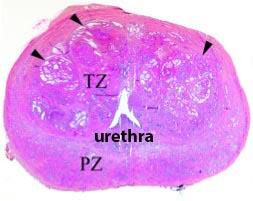The goal of the Strand Laboratory is to understand the cellular and molecular biology of lower urinary tract symptoms (LUTS) due to benign prostatic hyperplasia (BPH) or bladder dysfunction. BPH/LUTS is present in the vast majority of men over 70 years old resulting in medical treatment or surgical intervention.
We focus on translational questions related to progression of BPH/LUTS in order to develop new targets for therapeutic intervention. In particular, we are interested in characterizing the cellular composition of particular phenotypes that are resistant to current therapies. We use a combination of single cell RNA sequencing, flow cytometry, and immunohistochemistry on normal and diseased human specimens to build a cellular atlas of prostate and bladder disease.
 Cross-section of a prostate gland, showing the transition zone (TZ) and the peripheral zone (PZ)
Cross-section of a prostate gland, showing the transition zone (TZ) and the peripheral zone (PZ)